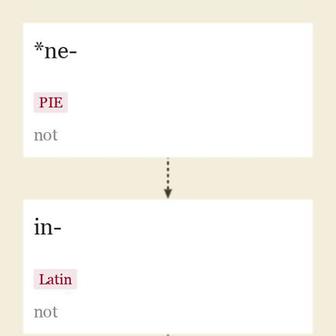Words related to innocent
mid-14c., "freedom from guilt or moral wrong," from Old French inocence "innocence; purity, chastity" (12c., Modern French innocence), from Latin innocentia "blamelessness, uprightness, integrity," from innocens "harmless; blameless; disinterested" (see innocent). Meaning "lacking in guile or artifice," as of childhood, is from late 14c. Meaning "freedom from legal wrong" is from 1550s.
late 13c., "foolish, ignorant, frivolous, senseless," from Old French nice (12c.) "careless, clumsy; weak; poor, needy; simple, stupid, silly, foolish," from Latin nescius "ignorant, unaware," literally "not-knowing," from ne- "not" (from PIE root *ne- "not") + stem of scire "to know" (see science). "The sense development has been extraordinary, even for an adj." [Weekley] — from "timid, faint-hearted" (pre-1300); to "fussy, fastidious" (late 14c.); to "dainty, delicate" (c. 1400); to "precise, careful" (1500s, preserved in such terms as a nice distinction and nice and early); to "agreeable, delightful" (1769); to "kind, thoughtful" (1830).
In many examples from the 16th and 17th centuries it is difficult to say in what particular sense the writer intended it to be taken. [OED]
By 1926, it was said to be "too great a favorite with the ladies, who have charmed out of it all its individuality and converted it into a mere diffuser of vague and mild agreeableness." [Fowler]
"I am sure," cried Catherine, "I did not mean to say anything wrong; but it is a nice book, and why should I not call it so?" "Very true," said Henry, "and this is a very nice day, and we are taking a very nice walk; and you are two very nice young ladies. Oh! It is a very nice word indeed! It does for everything." [Jane Austen, "Northanger Abbey," 1803]
For sense evolution, compare fond, innocent, lewd, also silly, simple.
"simpleton, fool," 1590s, perhaps a misdivision of an innocent (see N for other examples), or from the pet form of the proper name Innocent, with sense influenced by the name's literal meaning. There may be some influence in the word of Italian ninno "baby, child" (cognate with Spanish niño). Related: Niniversity "school for idiots" (1580s).
word-forming element meaning "not, opposite of, without" (also im-, il-, ir- by assimilation of -n- with following consonant, a tendency which began in later Latin), from Latin in- "not," cognate with Greek an-, Old English un-, all from PIE root *ne- "not."
In Old French and Middle English often en-, but most of these forms have not survived in Modern English, and the few that do (enemy, for instance) no longer are felt as negative. The rule of thumb in English has been to use in- with obviously Latin elements, un- with native or nativized ones.
Proto-Indo-European root meaning "death." It forms all or part of: innocent; innocuous; internecine; necro-; necropolis; necrosis; necromancy; nectar; nectarine; nociceptive; nocuous; noxious; nuisance; obnoxious; pernicious.
It is the hypothetical source of/evidence for its existence is provided by: Sanskrit nasyati "disappears, perishes," Avestan nasyeiti "disappears," nasu- "corpse," Old Persian vi-nathayatiy "he injures;" Greek nekros "corpse;" Latin nex, genitive necis "violent death, murder" (as opposed to mors), nocere "to harm, hurt," noxius "harmful;" Greek nekus "dead" (adj.), nekros "dead body, corpse;" Old Irish ec, Breton ankou, Welsh angeu "death."


